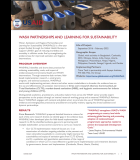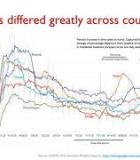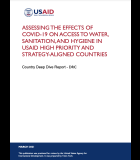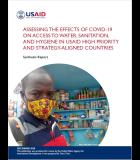The Health and Finance Governance Project (HFG)
The Democratic Republic of the Congo (DRC) has traditionally operated in a highly centralized manner, with limited authorities delegated to the subnational levels. But in 2006, the new constitution made several profound institutional reforms based on the principles of decentralization. In the health sector, this reform has significant implications.
Provinces gained the authority to hire and manage the health workforce; develop, support, and supervise health programs consistent with the national health development plan; manage hospital, laboratory, and pharmaceutical services; promote primary health care services at the facility and community levels; and disseminate and enforce health laws and regulations.
Under the decentralization reforms, the central Ministry of Public Health (Ministère de la Santé Publique, MSP) has been progressively moving toward establishing the new provincial health divisions (DPS’s), consolidating the number of central directorates from 13 to 7, and downsizing the number of central directorate staff from 1,012 to 598.
While much conceptual work on the reform has been accomplished, much has yet to be implemented, especially in the area of institutional strengthening. The HFG project is assisting in the implementation of the reforms at the central and provincial levels.
In addition to supporting the MOH reform, HFG is also providing support to the Kinshasa School of Public Health (KSPH). The project’s work with KSPH involves strengthening its financial management system so that it can receive funding directly from USAID and financially supporting a scholarship program. HFG began its activities in the DRC in early 2015.
Activity Description
At the central level, HFG’s focus is the institutional strengthening of three central directorates within the MSP: the Directorate of General Services and Human Resources, the Directorate of Administration and Financial Affairs, and the Directorate of Organization and Management of Healthcare Services. Assistance includes leadership and management training, clarification of roles and responsibilities under the new structure, strategic and operational planning, strengthening teamwork, and modest information and communications technology support.
At the provincial level, HFG is supporting the establishment of DPS’s in Lualaba and Haut-Katanga provinces. HFG’s assistance—similar to the capacity building and institutional strengthening support to the national level directorates— will help these DPS’s function effectively under the decentralized system. HFG will also work to strengthen the provincial coordinating committee. In 2015, in both provinces HFG helped develop the first annual operational plans, and conducted a situation analysis for the 2016 operational plan.
In 2016 HFG and KSPH also trained MSP, DPS, and other central ministry staff on the basic concepts and principles of decentralization—ensuring understanding of decentralization by key decision-makers.
Expected Outcomes
- Improving financing by mobilizing domestic resources, reducing financial barriers, expanding health insurance, and implementing provider payment systems;
- Enhancing governance for better health system management and greater accountability and transparency;
- Improving management and operations systems to advance the delivery and effectiveness of health care, for example, through mobile money and public financial management; and
- Advancing techniques to measure progress in health systems performance, especially around universal health coverage.





